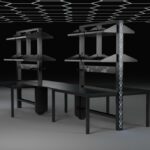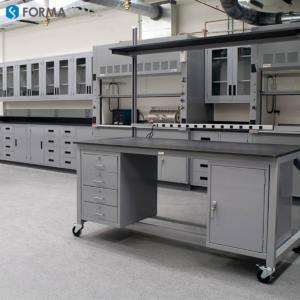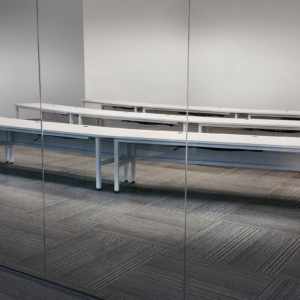Communities along the coast of Texas, from Corpus Christi in the west to Beaumont in the east were devastated by Hurricane Harvey’s storm winds and subsequent unprecedented flooding. We spoke with Jeff Turk, Formaspace’s CEO, and Daniel Goldfine, Regional VP of Sales at Hertz Furniture, about their first-hand experiences on the ground during the storm as well as their predictions about the effect on the US economy (particularly the furniture market) as Texas recovers.
It’s nice to speak with you, Jeff. We know you saw the dangerous impact of Hurricane Harvey from the air, from the water and from the ground. Tell our readers your story.
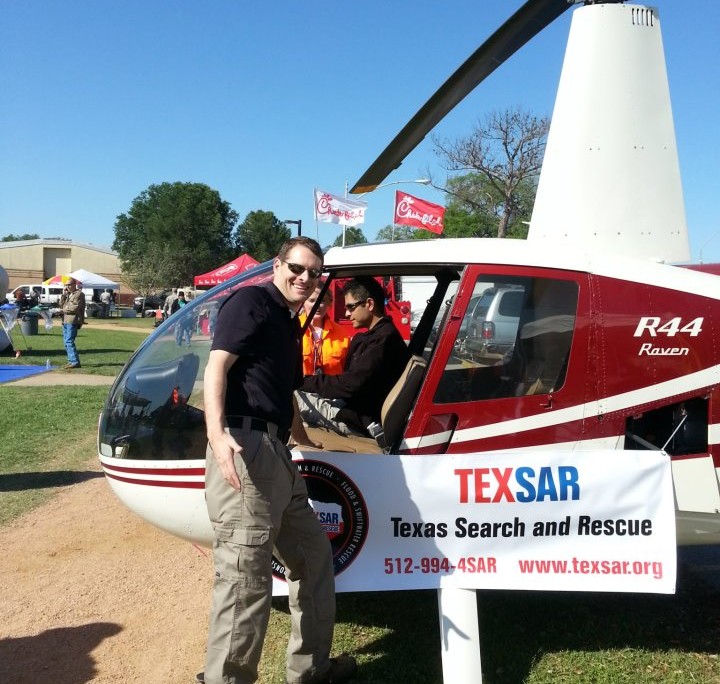
The day Hurricane Harvey was to make landfall, I was at Northwestern University outside Chicago giving a lecture on entrepreneurism. The instant the event concluded we rushed to the Formaspace plane to fly back to Texas. We needed to get back quickly because I’m the aviation branch director for Texas Search and Rescue (TEXSAR), an all-volunteer search and rescue team and I knew we’d be deployed to help in the aftermath of the storm.
With the high winds, we couldn’t land in Austin or at the surrounding airports, so we landed closer to Waco. I drove a truck down toward Corpus Christi (my hometown) to join up with the TEXSAR team deployed to Port Aransas where Harvey made landfall. But then I found out we were redeployed to do swift water rescues in the flooded Dickinson Bayou, south of Houston in Galveston County. (I’m also a swift water rescue technician and rescue diver.) I met up with my TEXSAR convoy an hour outside of Houston at a gas station. To give you an idea of the volatile weather conditions, a tornado took out that gas station where we met not one hour later.

We spent the first afternoon and evening in the water doing difficult extractions in Dickinson, mostly non-ambulatory patients in significant distress. Twenty-six of us spent two nights sleeping in a large closet at the Galveston County OEM (Office of Emergency Management). I got fifteen minutes of sleep the first night and four hours and fifteen minutes the second night. The third night I saw the tanks and APCs roll into Friendswood. That night I slept in the Friendswood jail.
I’ve never driven over more power lines, run more red lights (we call it running code – lights and sirens), or spent more of my day wet and utterly exhausted than I did in those few days. I hardly took my wet-suit off for four days. There’s a kind of cold that seeps into your bones when you are wet day and night, cycle after cycle.
Hurricanes and floodwaters can be terrifying. What was your impression of Hurricane Harvey? How does this rescue work affect you personally?
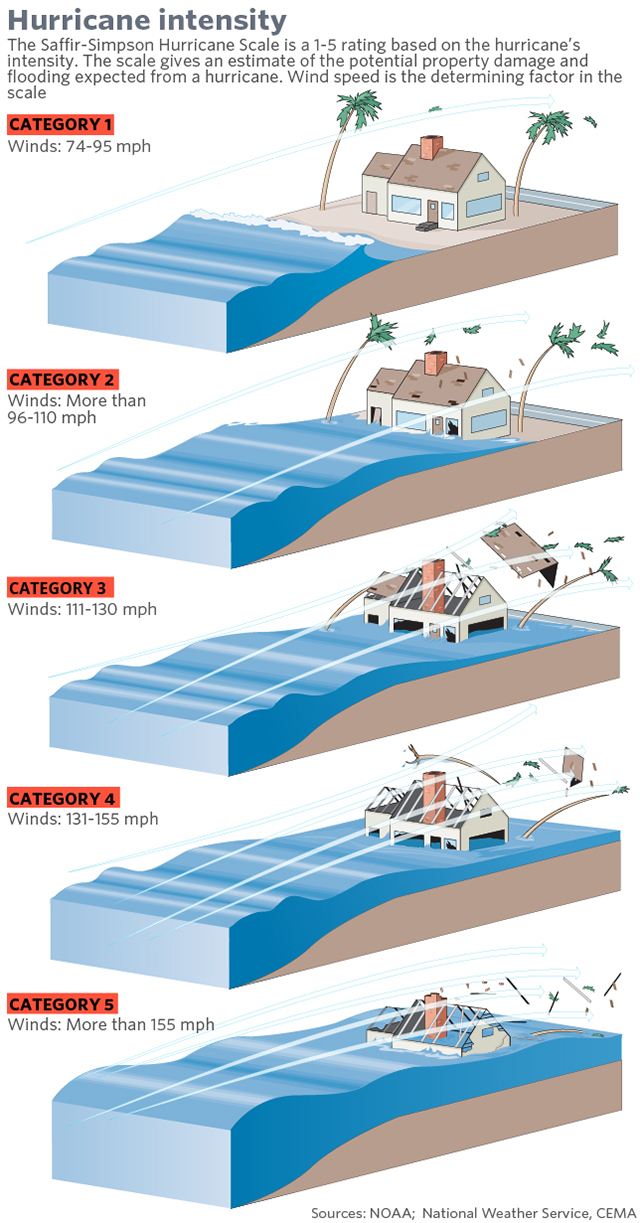
All hurricanes are surreal experiences. I rode out Category Five Hurricane Allen in 1980, which was one of the most powerful storms in recorded history. I’ve been in others since. It’s interesting to see wind toss yachts like playthings, drive water into light bulbs, and turn simple wood splinters into bullets.
I didn’t see quite as much of that (e.g. wind damage) in this storm as in others. This storm did more flood damage because it sat and dumped fifty inches of rain on the fourth largest city in the United States. It was interesting to drive boats down city streets. Most of my water rescues over the years have been on rivers, not in subdivisions.
When you save human lives and fail to save others, you re-emerge from the storm with a different perspective on life. Life is ephemeral. These events are ugly and beautiful, horrific and hilarious, and often, just absurd. I respect the fact that we are here only briefly and always go home to hug my family.
Beyond the hurricane, several times a year I’m called out to perform a rescue in the helicopter in the middle of the business day. The helicopter is six minutes from the office. So I sometimes have the opportunity to literally save a human life and hear a client self-righteously demand a free expedite the same day. It’s a bizarre kind of privilege.
That’s an incredible story, Jeff. After flooding in Houston, Harvey moved east from Houston to devastate the region surrounding Beaumont and Port Arthur in East Texas.
That’s right. After flooding Houston for days on end, the storm moved east. But there was no way for us (the TEXSAR convoy) to get to Port Arthur as the bridges and roads, including the major east-west interstate, I-10, were all underwater, damaged, or destroyed.

Then, to top it off, Hurricane Irma was devastating the Caribbean and was threatening the Florida Key and the Florida peninsula. TEXSAR was also called up to assist in Miami, but when the track of the storm shifted west, they canceled that request before I departed for Florida.
What about Houston’s infrastructure? There’s been a lot of talk about how things need to be done differently in the future. What’s your opinion on how things should be rebuilt?
At a policy level, it’s quite obvious to me that we shouldn’t be building houses on floodplains. As I think of all the victims whose remains I’ve recovered over the years, I can’t think of a single one who needed to die. To me, every single one of them represents a failure of our government — a warning not given, inadequate public education, mental healthcare not provided, a bridge built too low, a low water crossing sign not erected, a building permit issued for houses to be built on the floodplain. I have learned that in politics and government, there is a tremendous diversity in terms of concern for human life.
What about the economic impacts both nationally and at the state level? What effect does a major storm like Hurricane Harvey have on the furniture business, both in the short and long-term?
For Formaspace specifically, we are, in part, an online business. As soon as any major weather system approaches part of the country, searches for capital goods like furniture drop like a rock. Of course, the interest in our products for that part of the country will drop to zero during and immediately following the event. And then, maybe a year later, we might win a furniture order where a lab or office was damaged or destroyed.
As far as Texas overall goes, it is going to have a negative short-term impact. The fourth largest city in the country is still partly underwater. There is no power in some places. Whole school districts are closed for the remainder of the school year. However, in the long term, the infrastructure will all be rebuilt, probably a little better than before. The economic theory for this part of the world is that the economic cost major storms are, in the long run, more or less neutral.
Recovery will happen in fits and starts. Some places have already reopened, while others will never be rebuilt. Some industries will have a boom, while others will struggle to recover. I tell you what though, you have to give a lot of credit to the citizens of the State of Texas. I saw homeowners ripping the carpets out of their houses and cutting drywall back before the water had even fully receded. Talk about grit. You have to respect that.
Here at Formaspace, we’re going to give priority to disaster areas to get furniture products out to them faster; we’re also giving discounts to clients who were impacted by the storms. We may include a few services we normally charge for, such as on-site project management. Clients can also ask us about mobile lab options and other disaster recovery services. There is no other company better positioned or more knowledgeable about disaster recovery. After all, we’ve already been there.
Are there plans to help victims in the US or the Caribbean hit by the other hurricanes this season?
We will extend every manner of support possible to every disaster area, including Puerto Rico and affected areas of the Caribbean. Again, we’ve been there.
I’d also like to encourage everyone to help in the way that you can. If you can’t physically go and help, money is the best way to give. A reputable non-profit organization, at a bare minimum, should devote 80% of funding directly to operations: Last year TEXSAR was at 92%. There are organizations like TEXSAR that use your money extremely efficiently and put it to immediate use. Unfortunately, there are some large, national organizations that pass on less money to those in need compared to other, more efficient organizations. I recommend you check the website Guidestar to see independent ratings for charitable organizations before making a decision on where to give.
Are there any Formaspace customers in the areas affected by Hurricane Harvey we can talk to?
That’s a good idea. I’ll put you in contact with several Formaspace dealers in the region that might have time to talk with you.
Great. Thank you for speaking with us Jeff.
In the second part of this interview we contacted Daniel Goldfine, who is the Vice President of Sales – South Central Region at Hertz Furniture in Houston, to get his perspective on how Houstonians responded to the storm — before, during, and after — as well as the economic aftermath of the recovery.
Hello, Daniel. We’ve just interviewed Jeff Turk, the CEO of Formaspace, about his experiences rescuing flood victims during Hurricane Harvey. He suggested we call you to get your personal perspective on how the storm affected you, your family, and the Houston community, as well as to find out your take on the economic impact on the furniture industry now that we are in the recovery phase.
First of all, where were you when Hurricane Harvey was churning around in the Gulf of Mexico?
I was actually in Austin (at our facility there) when I learned that Harvey could be a real threat to either Houston or Corpus Christi. As a longtime resident of Houston, I know the perils associated with the storms, the risk and damage from flooding, and also the prospect of days and days without power and utilities.
Once I learned that Harvey was heading towards Corpus, I made the decision to return to Houston to ride out the storm. I picked my daughters up from school, and we did last minute shopping for supplies to prepare for a long weekend at home.
The storm was very perilous, very scary. The water kept rising in my yard until it came within two inches of my front porch. My young daughters got frightened watching their father look out the front door. They started asking questions, like “Dad, what happens if it comes into the house, are we going to go up into the attic?” So to say it was a little anxiety-causing is an understatement…
The waters rose, then subsided a bit on Saturday night. But they started to rise again on Sunday morning. In the light of day, we could really see the impact of the flooding — the entire front yard and the street were totally under water. You start to realize this is a tricky situation. So we had made preparations just in case we had to go upstairs (into the attic), but like I said, thank God, it didn’t come to that for us. In the end, we were really so incredibly fortunate. We had a small leak, that’s it.
But it was a surreal experience, and we soon learned about friends who were being rescued from their homes by boat. In one case, friends of mine that live just a couple of miles away waited for eight hours in their attic for somebody to come by in a boat to rescue them.
As the real impact of the storm begins to come into focus, you start to jump into action: you invite people who lost everything to stay in your house; you prepare meals and share resources. One thing that always shone through during this difficult time — it’s the people who live here, and the way that we cared for each other. It makes me proud to be a Houstonian; proud of my city and what a really special place it is. The amount of volunteer work here is amazing. And then, of course, we had assistance pouring in from around the world — from Israel, from New York, from Dallas. The Jewish community of Dallas hired a big BBQ food truck — basically a catering company on wheels — and they sent it down to Houston with I don’t even know how much food.
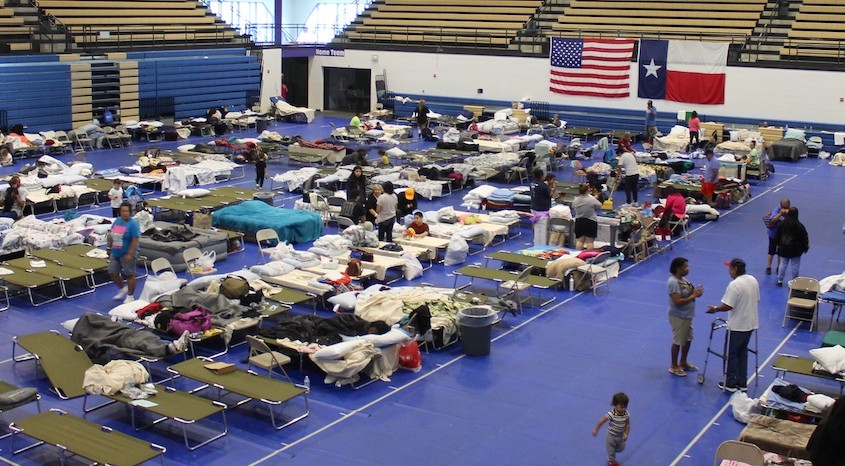
The Jewish Community Center in my neighborhood was flooded, but fortunately, our school was not impacted by the flood. So the BBQ food truck set up camp in my children’s school, which turned into an impromptu community rescue center. They were hosting people who needed a place to sleep and serving hundreds and hundreds of meals a day. It also became a distribution point for supplies, and a place for organizing people who were coming in to volunteer.
Of course, after a flood, everyone needs to get that wet Sheetrock and wet wood out of their homes a.s.a.p. before these structures become even more toxic. There’s a rush to find enough labor, but everybody pitched in. I don’t know of anybody who wasn’t involved in one way or another. I had friends who brought food in from Austin, and I made a trip to San Antonio to get things we were running out of, like kosher meat. And my friends were not just cooking to feed the people in our little community, they were also delivering meals out to firehouses and police stations.
So the storm has passed, but the devastation is still here, it continues. There were many tragic sides to the storm. For example, the home of my new salesperson flooded out. Like many of her neighbors in these flood-prone neighborhoods, such as Meyerland or Bellaire, it’s the third time her house has flooded in the last three years. Even though she rebuilt her house six feet above the ground, it still took on two foot of water in the house. You can’t imagine how complicated this becomes — because of the law of supply and demand, there are very limited resources in terms of available contractors and insurance company adjusters. Nothing is ever easy. It’s just not easy.
That’s a terrible situation. What was the effect on Hurricane Harvey flooding on the Hertz Furniture facility?
The storm came Friday night, and let’s say for the first several days, we were distracted taking care of the needs of our friends and community. But Hertz opened up for business the following Friday morning. The Hertz facility in Houston is a ‘dock high’ space, so the water didn’t even come close. We were very, very fortunate in that regard. The reason we couldn’t reopen right away was because the roads to the facility were impassible due to high water.
It’s interesting just how quickly people found out Hertz had an available warehouse with loading docks and storage space. Our busiest time of year had just ended in August, so the warehouse went from jam-packed to nearly empty. So we had space to take truckloads of donated goods, such as pillows, cleaning supplies, bottled water, and mattresses. As a result, Hertz Furniture has gone into the supply distribution business for the last couple of weeks!

What is happening to your ongoing furniture business now, such as projects that were in the sales pipeline? Are things moving forward, getting postponed, etc.? Do you think there will be a long economic downturn as a result of Harvey or will the furniture market bounce back quickly?
It’s a double-edged sword. On the one hand, projects we counted on coming have been put on hold. For example, in one of our big markets, the education sector, they may have allocated funds to put up a new building or a new wing of classrooms before the storm, but now they might have to spend these funds on uninsured damage repair instead. That’s going to impact projects in the pipeline.
On the other hand, Houston Independent School District (HISD), which is one of our biggest customers, had fifty-three campuses flood during Harvey. The vast majority of those were two-story campuses. HISD took their top six vendors aside and assigned each of us something like eight or ten schools. They said to us: “We need to get these schools up and running again on September 24th, so go in there, see what they need, and get it. Doesn’t matter what color, etc. Just furnish it.” So in just a couple of weeks, we furnished the first floors of eight flooded out schools from scratch! It was quite a remarkable achievement.
That’s additional business for Hertz. But for every organization like HISD, with their kind of budget, there also are plenty of people calling us asking for help, saying things like “Our church flooded, do you have any extra chairs, you could really help us out.” Okay!
Unfortunately, there are so many people with no insurance. Places that were not in the flood zone suddenly flooded, in some cases, it may have been due to the way they drained off the reservoirs before, during, and after the storm. The bottom line is so many people have no insurance whatsoever.
Dan, you’ve been in the furniture business for a long time, and you know this market very well. We’ve had back-to-back hurricane disasters in Texas, Florida, Puerto Rico, and across the Caribbean, as well as major earthquake damage in Mexico. Q4 is said to be the best quarter for the furniture industry, do you foresee a short or long-term nationwide impact due to this serious series of natural disasters?
It’s a complex question. While the third and fourth quarters are usually the biggest for the furniture business in general, I think that applies more to the retail furniture business (and less to the contract furniture market).
I also know that debt costs and energy costs are an important component of the average American’s budget. And those costs are going up. Insurance is going to go up a lot. We’ve already had lots of huge insurance and auto insurance increases over the last several years because of insurance companies recovering their reserves from all the losses they’ve been paying out (due to natural disasters, etc.). It wouldn’t surprise me to see homeowners’ insurance rates go up 50% across the board. That’s going to take a significant bite out of an American’s disposable income, certainly in 2017.
I also think the energy market will have an economic impact — think about the gasoline shortages we had right after the hurricane. In our case, we literally missed important sales appointments in San Antonio because my sales rep wasn’t sure she could get enough gasoline to make multiple trips to San Antonio and back. Obviously, those supply shortages have mostly worked themselves out by now. But the effect of these disruptions in the supply of refined fuel — multiplied out over many businesses — is going to hurt the economy in the short run.
In the big picture, I don’t see this as a good thing for us nationally. I think the federal government’s budget, and certainly the budget at the state level, are going to be really drained. You’ll have to cut programs in a time when you’re paying hotel bills for literally tens of thousands of people, and funding rehab costs. Taking a house and raising it four feet or five feet so that it becomes habitable and safe is very expensive. There’s not going to be a lot of money left over for things like employee raises.
Thanks for your insight Dan. We really appreciate it. Is there anything else you’d like to add?

I’d also like to thank our manufacturers who came to us and said, “Tell us what you need. Put in your orders for hurricane victims and hurricane-damaged schools. We’ll stop production to make your orders first. We’ll give you an extra 20% discount.”
“What else do you need? We’ll donate it.” And so we’ve literally had manufacturers donating truckloads of furniture to those who are without the resources to carry on.
So thank you to the public for donating and volunteering, and thank you to everyone out there in the furniture industry who have helped us out so much. We really appreciate it. And most importantly, thank you for keeping us in mind and for praying for us, and paying attention to us.
Best wishes for a good week. Thanks for calling and let me know if I can help!




